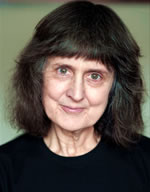Write Words Interview
Tell us about your books, any awards you’ve won, etc
My novels include Benefits, Stand We At Last, Here Today, Closing, Daddy’s Girls and Other Names. Here Today won the 1984 Fawcett Book prize; Benefits was shortlisted for the Hawthornden Prize for imaginative literature and the Philip K Dick award for science fiction; and in 1998 Other Names was shortlisted for the Romantic Novelists’ Association award. I’ve also written short stories, drama, poetry and non-fiction. You can find more information on the British Council Contemporary Writers website.

How did you start writing?
I wrote my first story on the flyleaf of an old copy of Rudyard Kipling’s The Just So Stories, when I was four. I don’t know why I did it; it seemed like a natural thing to do.
Who are your favourite writers and why?
I don’t have favourite writers, just favourite books. If I am ever cast away on a desert island with my choice of books, they will include Vida by Marge Piercy, Slaves of Solitude by Patrick Hamilton, Mrs Palfrey at the Claremont by Elizabeth Taylor, Movement by Valerie Miner, A Suitable Boy by Vikram Seth, Victoria Line, Central Line by Maeve Binchy, Polaris and other Stories by Fay Weldon, Au Bonheur des Dames by Emile Zola.
How did you feel when you first started sending your writing out into the world?
Determined.
What was your breakthrough moment- when it all got serious?
It was always serious.
How did you first get an agent?
When I was in my teens, I joined a local poetry group. Through that I met the writer Michael Baldwin, who introduced me to his agent, Michael Thomas of A.M. Heath. Michael Thomas became my agent, and continued until his retirement in 1998.
How did/do you handle rejections?
Oh, I take them in my stride. They don’t bother me at all. I just chew up a few light bulbs, beat my fists against the wall, go on a boozing or eating binge (depending on the time of day) and plan a fiendish revenge. I rarely put these plans into action – for one thing I don’t actually know how to administer a karate chop or send a killer virus to someone’s computer, and for another, why give them the satisfaction? On a more rational level, I try to remember that it is not rejection, it is simply the publisher exercising their right as a customer either to buy or not to buy. It’s always disappointing not to be chosen, but it’s not a statement of our utter worthlessness as human beings. (It just feels that way…)
What was it like when you first saw your work in print?
It was odd, because I wasn’t expecting it. I was five and I had written a story and suddenly there it was in the school magazine. I was embarrassed because although everything else in the school magazine was perfectly spelt, my spelling errors had been left intact, with a little note from the editor drawing attention to this, as if they thought it cute.
What’s the best thing about writing?
The permanence, the continuity, the sense of solidarity and shared experience with writers in the past and the future. Books are physical objects which with a bit of luck will outlive their authors. It’s nice to think that, decades from now, when I am either dead or extremely old, someone who at the moment is not even born, may find one of my books and read it.
And the worst?
Its addictive, compulsive quality. That huge buzz when things go right (publication, good reviews) and the awful gloom and depression and self-questioning that comes with rejection and disappointment. I’d like to live my life on a more even keel. (It’s partly for this reason that I have another job as well – see below.)
What kind of response do you get from readers?
One of my favourites was a long, handwritten letter from a man who was looking after his children in a supermarket cafeteria on a Saturday morning while his wife did the shopping. He had just read Daddy’s Girls, and said it had evoked a lot of thoughts and self-questioning about being a father. The letter went on for pages, and was interesting, funny and touching. I would have loved to reply, but he didn’t give his address. If he’s reading this – hi, and thank you.
Do you have a writing routine? A place that’s special?
Mornings are best for me. If I’m working on a project that absorbs me, I have no problem getting up at 6am, 5am or even earlier. I’ll then work till about one, possibly taking a break at around 10 to go out to a local coffee shop where I sometimes meet up with some other local writers for a cappuccino and a natter. Then I go back home and carry on writing till about one, but not after that. I have an attic room with two desks, a computer, lots of bookshelves, a comfortable armchair and, over the window, an Aborigine dream catcher which was given to me by an Australian poet.
What advice would you give to a new writer starting out?
At the risk of sounding like a Nike ad – just do it.
What inspires you to write?
I don’t always know, particularly at the time. It just feel like an intense and passionate interest in something or someone, and a desire to build a story. Afterwards, I can often see patterns. In my short story collection How Do You Pronounce Nulliparous? (Five Leaves Press) I find myself returning again and again to the gaps between words and actions – the way so often we say one thing, mean another and do something else. In the title story, a 40-something woman who has never had children and never wanted to, revisits her decision, remembering the many things she has been told about motherhood by mothers. In Meek & Mild, a young child is sent to a school run by a religion that neither she nor her parents belong to. In Capitalists ‘R’ Us , ageing anti-capitalist activists try to square their beliefs with their desire to give up work and live on investment income (or retire on a pension, as it is more generally known). Words are the writer’s tools; some have sharper edges than others, but they are not always equal to the complexities we face. Writing fiction is my way of trying to make sense of these.
Do you address particular themes or issues in your writing? Ones that you come back to time and time again?
Probably, but I don’t analyse my work in that way. I leave that to readers and critics.
